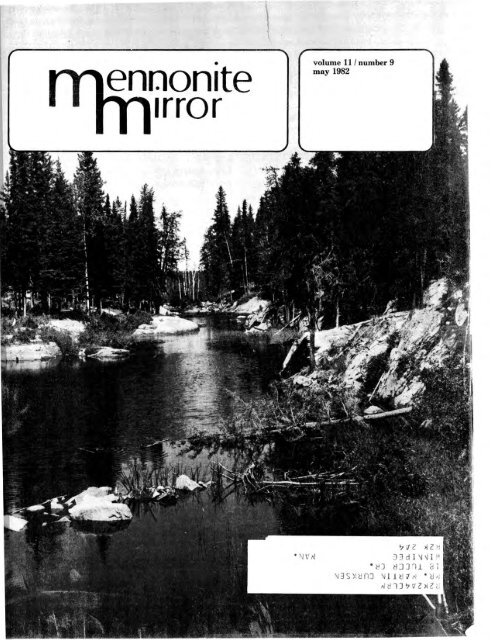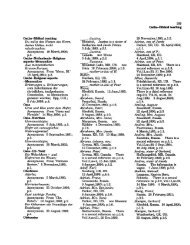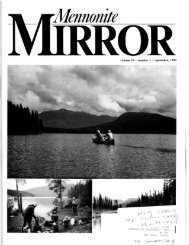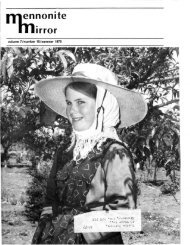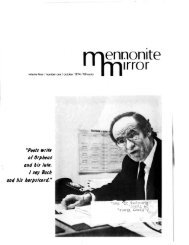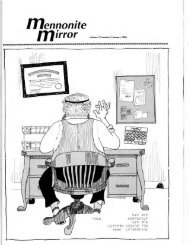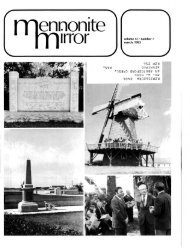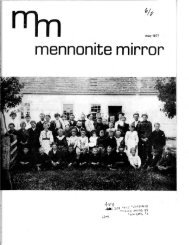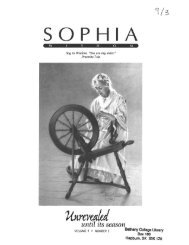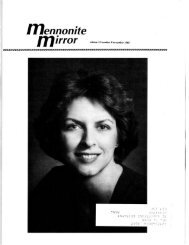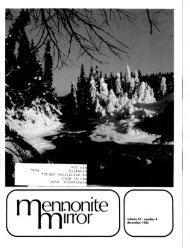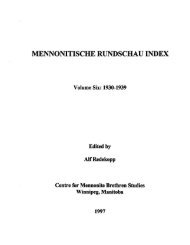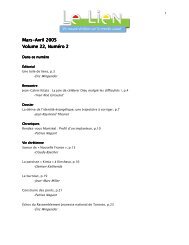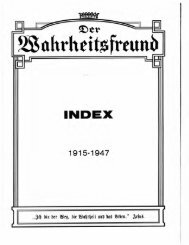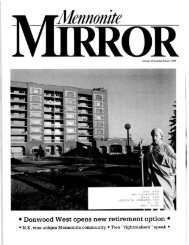Volume 11/ Number 9 - Canadian Conference of Mennonite ...
Volume 11/ Number 9 - Canadian Conference of Mennonite ...
Volume 11/ Number 9 - Canadian Conference of Mennonite ...
Create successful ePaper yourself
Turn your PDF publications into a flip-book with our unique Google optimized e-Paper software.
tatious structure. He did not know why<br />
he pulled over. They still had several<br />
miles to go and the sun was getting low.<br />
It was customary, however, to stop<br />
anywhere along the way to pass the time<br />
<strong>of</strong> day. And he was tempted to see the<br />
sinful inside <strong>of</strong> this building. One thing<br />
was certain, he had no intention <strong>of</strong> spending<br />
good money to stay in such a place<br />
overnight. But when he saw the looks on<br />
the boy's faces while they were tethering<br />
the animals, he s<strong>of</strong>tened. He merely<br />
glanced again at the teams and said<br />
gruffly, "They are a bit sweaty; I guess<br />
we'd better stay; that is, if the stable is<br />
ready for business."<br />
Supper was a hearty meal prepared by<br />
the hotel's cook but for breakfast they<br />
merely ordered c<strong>of</strong>fee into which to dunk<br />
the roasted sliced rolls which<br />
Margaretha had prepared for them.<br />
Jacob sensed that the boys were even<br />
more ashamed than he was to admit that<br />
they could not afford hotel meals; but<br />
money was money, and besides it was a<br />
good chance to teach them Christian<br />
humility.<br />
Soon they were on their way again,<br />
skirting the heavy trees along the river.<br />
Their destination was a bend where they<br />
had spent several weeks after freeze-up<br />
the preceding fall. Even little Jake had<br />
done a man's work cutting down trees,<br />
8 / mennonite mirror / may 1982<br />
trimming <strong>of</strong>f their branches, and piling<br />
the logs neatly. It had been strenuous<br />
but not too unpleasant. It was before the<br />
worst <strong>of</strong> the winter cold but the frozen<br />
ground made it easy to skid the logs into<br />
place. The absence <strong>of</strong> summer insects<br />
was a substantial blessing. By<br />
Christmas they had prepared enough<br />
material to build a new house.<br />
"There it is, " Jake pointed as he<br />
shouted to his father who was again<br />
following the team <strong>of</strong> oxen with the<br />
horses. "this coulee, remember, Peter?<br />
We nearly upset a sleigh when we tried<br />
to cross here last year."<br />
"Yes, Jake, let's cross it over there<br />
where it is safer and then turn towards<br />
the river."<br />
After they entered the bush Jake had<br />
to walk ahead to find a trail between last<br />
year's stumps which were. still covered<br />
with snow. "Here's the camp," he called.<br />
"It's still in pretty good shape, don't<br />
you think?"-<br />
But Peter's eyes and thoughts were<br />
not on the rude shelter. "Where are our<br />
logs, Father?" he shouted as Jacob<br />
pulled up alongside. "Didn't we pile<br />
them right there to our left?"<br />
"Yes, we did." Jacob answered. "Let's<br />
go closer and see. Maybe the · piles fell<br />
over and the logs are covered with<br />
snow." _ The boys rushed ahead. But<br />
WE INVITE YOU<br />
TO EXPERIENCE CHRISTIAN, POST<br />
SECONDARY EDUCATION WITH US.<br />
-BIBLE<br />
-THEOLOGY<br />
-MUSIC<br />
- CHURCH HISTORY<br />
- PRACTICAL THEOLOGY<br />
-ARTS<br />
Jacob followed them dejectedly; he<br />
knew so many logs had to be quite obvious<br />
at such a short distance. As he expected,<br />
they found the space they had<br />
cleared for them, but not a sign <strong>of</strong> the<br />
logs.<br />
"What do you think happened to<br />
them? They couldn't just disappear like<br />
that." It was Jake stating the obvious.<br />
"Maybe they caught fire and burned. "<br />
Peter's suggestion was a reasonable one,<br />
but there was no sign <strong>of</strong> ashes under the<br />
snow.<br />
"Maybe the river flooded and carried.<br />
.. " Jake didn't even finish the sentence.<br />
When they left here the river was frozen<br />
over and it was still solid. "What do you<br />
think, Father?" he asked, completely at<br />
a loss for once.<br />
Jacob was not much more worldlywise<br />
than the boys, but he realized there<br />
was really only one answer. "Somebody<br />
else must have taken the logs." he said<br />
sadly.<br />
"After we worked so hard to get them<br />
ready? Who would do such a think?"<br />
"Maybe we already slept under our<br />
logs last night." Jacob conjectured.<br />
"The hotel? How do you know?<br />
Somebody stole them for the hotel?"<br />
"I don't know. I said maybe. And even<br />
if they were used to build the hotel<br />
maybe they didn't steal them; maybe it
y Nan Doerksen<br />
"Children's play is a re-enactment <strong>of</strong><br />
stories their parents tell them, or conversations<br />
they overhear," said Vera,<br />
rather dogmatically, as she helped<br />
herself to a cookie.<br />
Vera's husband is a psychology pr<strong>of</strong>essor;<br />
some <strong>of</strong> the things she says<br />
sound like echoes <strong>of</strong> his lectures.<br />
"Oh that's much too neat; too<br />
simplistic," I objected. "Surely you<br />
must give them some credit for originality.<br />
I can't believe they are just little carbon<br />
copies <strong>of</strong> adults."<br />
" Not carbon copies, certainly. They<br />
recreate it as they see it, which could<br />
hardly be exactly as an adult sees it.<br />
Nevertheless the source is not original;<br />
it comes out <strong>of</strong> what they hear or see.<br />
Think back to your childhood. What<br />
games did you play?"<br />
As I stirred my c<strong>of</strong>fee, my thoughts<br />
went back to my childhood in northern<br />
Saskatchewan. My Russian-immigrant<br />
parents, with their nine children on a<br />
stony-soiled, scrub-wooded land, reliving<br />
the past in tales <strong>of</strong> starvation and<br />
danger, alternated with happy reminiscences<br />
<strong>of</strong> bountiful orchards and<br />
fruitful harvests. Should I shock this<br />
daughter <strong>of</strong> Britain, with her inpeccable<br />
pedigree and four generations <strong>of</strong> "lording"<br />
it in Canada, by revealing my<br />
alien origins? Even a pr<strong>of</strong>essor's wife<br />
can be surprisingly naive at times.<br />
"I'm not sure that will prove<br />
anything," I began slowly. "My parents<br />
were very poor. There wasn't any extra<br />
money for ,much in the way <strong>of</strong> toys or<br />
games. We made do with things such as<br />
paper dolls cut out <strong>of</strong> Eaton's<br />
catalogues, or hand-me-down dolls newly<br />
dressed and painted at Christmas."<br />
"Well, that's not the point. What did<br />
you play with them?" Vera was embarked<br />
on a project now and nothing would<br />
stop her.<br />
16/ mennonite mirror / may 1982<br />
Games we play<br />
" Let's see. We <strong>of</strong>ten played 'church'<br />
or 'weddings' with them. We'd make<br />
rows and rows <strong>of</strong> paper dolls sitting<br />
, quietly, women on one side, men on the<br />
other, and with one as the preacher.<br />
Then there were always some naughty<br />
little ones who had to be taken out during<br />
the service. When we played at getting<br />
married we had the procession and<br />
marriage cermony, taking turns at being<br />
the minister. The first wedding I can<br />
recall was one we certainly did imitate.<br />
My little friend played the part <strong>of</strong> flower<br />
girl at it and she cried all through the<br />
ceremony because she was losing her<br />
SIster. Very dramatic! Furthermore, the<br />
groom became ill half-way through the<br />
service and had to go out-and we all<br />
wondered if he'd come back. Imagine<br />
how the bride must have felt!"<br />
"Did he?"<br />
"What? Oh, <strong>of</strong> course. That was during<br />
the war. Some people wondered if<br />
getting married then was just a ruse to<br />
get out <strong>of</strong> going, although he was a conscientious<br />
objector and should have been<br />
granted exemption on those grounds."<br />
The puzzled look in Vera's eyes<br />
brought me back. What did she know <strong>of</strong><br />
such things?<br />
"And then we had play houses in summer,"<br />
I hurriedly continued. "Neatly<br />
laid out areas in the woods with shards<br />
<strong>of</strong> grass for dishes and stones for chairs<br />
and tables.<br />
" Oh yes, we played 'funerals' too.<br />
Children always attended them then. No<br />
such thing as baby-sitters in our area, at<br />
least not after my grandmother died.<br />
She lived with us, you see. I can<br />
remember the day she died quite well.<br />
My younger brother and I (we were<br />
three and five) were playing upstairs,<br />
while our father was taking a nap up<br />
there. Suddenly my mother called to him<br />
to 'come qui(,:kly-Grandmother is dying',<br />
and he started up out <strong>of</strong> sleep, all<br />
tousled and half awake. Of course we<br />
went down too and my brother wanted<br />
to know 'were her feet still there?'<br />
Somewhere he got the idea that the feet<br />
disappeared when someone died. Don't<br />
you think that was original?"<br />
"Hm-m-m. He probably heard someone<br />
say 'Grandma is going to heaven<br />
soon' and he assumed her feet would<br />
take her there. Children can't think in<br />
the abstract. Everything you've said so<br />
far shows your play was an imitation <strong>of</strong><br />
life around you."<br />
"But you said 'conversations and<br />
stories,'" I protested, "that's not quite<br />
the same. However, there may be something<br />
in what you said after all. One <strong>of</strong><br />
the games I can remember playing when<br />
I was very young certainly had its<br />
origins in the stories our parents told us.<br />
We usually had a supply <strong>of</strong> dried fruit in<br />
the house and, occasionally, Mother<br />
would give us some for a snack. I can<br />
remember carefully burying some <strong>of</strong> it in<br />
a 'safe' place, so that when the<br />
'Hungersnot' came, and there was<br />
nothing left to eat, we could go dig it<br />
up."<br />
"There, you see? That does prove<br />
something. May I have another cookie,<br />
please? They're delicious!"<br />
"Certainly. Another game we played<br />
consisted <strong>of</strong> bundling up our dolls in<br />
theIr warmest ClOtneS and blankets, and<br />
then we would get into bed with them,<br />
pretending we were in a sleigh travers- .<br />
ing the steppes <strong>of</strong> Russia in the middle j<br />
<strong>of</strong> winter. There were innumerable improvisations<br />
we could make on that<br />
theme. Sometimes wolves chased us;<br />
sometimes we lost one <strong>of</strong> the childrenor<br />
we were all lost in a blizzard. But we<br />
always came through safely in the end.<br />
What do you make <strong>of</strong> that?"<br />
Vera raised her carefully plucked eyebrows.<br />
"You've been reading too much<br />
Tolstoy, I think. Did you really play<br />
that?"
"Most emphatically! Another game<br />
we used to play was called 'one step<br />
higher', only we said it in Low-German;<br />
it sounds much better that way. I've<br />
forgotten all the details, but it involved<br />
a gradual ascent to the top <strong>of</strong> the stairs,<br />
and demotions for punishment or wrong<br />
answers. The first one to reach the top<br />
was the winner, <strong>of</strong> course. That must<br />
definately have sociological implications,<br />
don't you think? Maybe a reaction<br />
to the <strong>Mennonite</strong> ideal <strong>of</strong> brotherly<br />
equality. Not <strong>Mennonite</strong> really: Chris-<br />
t l8Il. · "<br />
'.' "Are you a <strong>Mennonite</strong>?" Vera sounded<br />
vaguely surprised, or was it bored?<br />
Surely she must have known. Would she<br />
come up with the usual question:<br />
"Aren't they the ones who wear black<br />
clothes and live on reserves?"<br />
"I read'*' an interesting book about<br />
you," she said, "by a <strong>Mennonite</strong>-Rudy<br />
Wiebe."<br />
I smiled and I recalled that another<br />
friend had said the same thing to me,<br />
and then added: "Now I finally understand<br />
you." Boxes and labels. Veras with<br />
their formulas. Well, to be perfectly<br />
honest, I was guilty <strong>of</strong> that too with my<br />
readiness to apply the WASP label.<br />
"More c<strong>of</strong>fee. Vera? What about pets?<br />
MOL TMANN SEMINAR<br />
A study <strong>of</strong> some <strong>of</strong><br />
Jurgen Moltmann 's<br />
representative works.<br />
In preparation for his lectures<br />
at CMBC in October<br />
May 25& 26<br />
atCMBC<br />
Contact the Extension Coordinator<br />
for more information<br />
or to register. Ii><br />
I raised 12 roosters once. They were all<br />
my special pets, all summer. I hana-fed<br />
and named them all. They were bigger<br />
and fatter than all the rest-so guess<br />
which ones were· eaten. I remember crying<br />
myself to sleep, nights, because <strong>of</strong><br />
my roosters. That does remind me <strong>of</strong><br />
something that happened before I was<br />
born. My mother used to tell us about it.<br />
I'm sure there's something symbolic in<br />
it."<br />
Vera's ears pricked up.<br />
"There was one 'English' family in our<br />
community. All the other people spoke<br />
German (Low or High), and most <strong>of</strong> the<br />
women never learned to speak English<br />
at all, only the men. Imagine, no evening<br />
classes. Why didn't they start them?<br />
Too busy, I suppose, with all those<br />
children. "<br />
"Would you attend classes if you had<br />
nine kids?"<br />
"-And <strong>of</strong> course this Mrs. Hanley<br />
couldn't speak German. However, she<br />
and my mother became friends, and it<br />
began with a visit by the 'English' lady<br />
to our house. It was spring-time and my<br />
mother had some newly hatched chicks<br />
in the house. Mrs. Hanley brought her<br />
young daughter with her, and, as my<br />
mother spoke in German and Mrs.<br />
Hanley spoke in English, trying to make<br />
some common ground, little May was<br />
absorbed in the chicks. Finally Mrs.<br />
Hanley, unable to communicate much,<br />
decided to leave. Mother, noticing May's<br />
interest in the chicks, presented her with<br />
one to take home. Little May understood<br />
at once (what child wouldn't) and <strong>of</strong><br />
course the mother responded and so<br />
began the friendship."<br />
"I don't see anything symbolic in<br />
that," Vera said frowning.<br />
"Oh, you know, two people from a<br />
completely different background, unable<br />
to speak each other's language, communicating<br />
through their children-or<br />
through their mutual interest in a child<br />
and a chick. Something like that."<br />
"And did they ever learn each other's<br />
language?"<br />
"No, not in words. Only actions. Each<br />
retained her separate identity, but they<br />
were friends. During the war, their sons,<br />
the Hanley sons, were all in the armed<br />
forces; all the others-no, not all-most<br />
<strong>of</strong> the <strong>Mennonite</strong>s boys did alternative<br />
service <strong>of</strong> one kind or another. I was too<br />
young to know how the Hanleys might<br />
have felt, but I thought about it years<br />
later. The day the war ended, my father<br />
and I were coming home with a load <strong>of</strong><br />
hay. As the wagon came up to the<br />
Hanley farm, Mr. Hanley came running<br />
out, shouting: 'The war has ended!' My<br />
father jumped down from the wagon to<br />
hear the news-and there they both<br />
stood with tears running down their<br />
cheeks. There was no difference between<br />
them."<br />
"That is beautiful," said Vera. She<br />
grinned. "I had no idea you were so old."<br />
We both laughed.<br />
"But coming back to your idea that<br />
children learn through imitation-isn!t<br />
that what you said?"<br />
"More or less," conceded Vera.<br />
"Well, what sort <strong>of</strong> games or<br />
'pretends' can our children have? Going<br />
to class' They do that anyway. Carrying<br />
on sociological discussions? Should we<br />
make a point <strong>of</strong> telling them all those old<br />
stories?"<br />
"Of course. Yes. You've got enough to<br />
last for seven generations. Stories to<br />
grow on. Yes, definitely."<br />
"Games and stories. Hey, the next<br />
time my teenager wants to know 'what<br />
good is history?', can I send him to<br />
you?"<br />
Vera shook her head vigorously.<br />
"Fight your own battles. I have one <strong>of</strong><br />
my own."<br />
"But isn't that just the point, Vera?<br />
We're all in this together. We have to<br />
support each other. The chick . story<br />
again. WASPS and <strong>Mennonite</strong>s, Moses<br />
and Tolstoy . . ."<br />
"M-m-m. Yes. Working together, sharing-and<br />
games too. Oh, oh, there come<br />
my monsters for their lunch. I've got to<br />
run!"<br />
"Bye, Vera." mm<br />
Have you ever<br />
moved and<br />
forgotten your<br />
mirrors?<br />
To change your addreS$ simply cut<br />
out the mailing label which appears<br />
on this magazine, and affix it to the<br />
space below:<br />
and write in your new address:<br />
Street ____________________ __<br />
City f Town ________________ __<br />
Postal Code _______________ _<br />
and then send it to our <strong>of</strong>fice:<br />
<strong>Mennonite</strong> Mirror<br />
203 . 818 Portage Avenue<br />
Winnipeg R3G ON4<br />
mennonite mirror/ may 1982 / 17
OBSERVED<br />
ALONG THE WAY<br />
March · April<br />
by Roy Vogt<br />
March 6: Participated in a Peace <strong>Conference</strong><br />
with about 200 young people at<br />
the <strong>Canadian</strong> <strong>Mennonite</strong> Bible College.<br />
It is exciting to see so many young people<br />
from across Canada trying to apply<br />
the Christian teaching <strong>of</strong> peace to issues<br />
like underdevelopment, labour relations,<br />
and Native rights.<br />
March 10: A different kind <strong>of</strong> evening.<br />
We are thinking <strong>of</strong> purchasing a tent<br />
trailer so my wife and I surveyed the<br />
goods at the boat and trailer show in the<br />
convention centre. We wandered into an<br />
area where a large group <strong>of</strong> people seemed<br />
to be watching a beauty pageant. At<br />
least there were a few girls in bathing<br />
suits on the stage. I stopped and looked<br />
for a moment, to make sure that everything<br />
was in proper order. My wife<br />
didn't share my moral concern and hurried<br />
back to the trailers. It turned out<br />
that what everyone was watching was<br />
not a beauty pageant but a musclebuilding<br />
contest. I had never seen<br />
anything like it. It was announced that<br />
the young woman on stage would now<br />
demonstrate a double-flex <strong>of</strong> the left<br />
elbow. She did it with great charm and<br />
rippling muscles. The audience applauded<br />
loudly. They obviously appreciated<br />
the difference between a single-and a<br />
double-flex <strong>of</strong> the elbow. It must be a<br />
sign <strong>of</strong> middle age, but I found the audience<br />
more interesting than the contestants<br />
on stage. Different folks enjoy<br />
different things. It reminded me <strong>of</strong> what<br />
a wrestling fan from the East Reserve<br />
told me recently. He alleged that<br />
everytime there is a wrestling match at<br />
the Winnipeg Arena a group <strong>of</strong> older<br />
<strong>Mennonite</strong> ladies from the West Reserve<br />
drives in to cheer on the husky<br />
gladiators. Could that be true?<br />
March 13-14: Stopped <strong>of</strong>f in St.<br />
18/mennonite mirror / may 1982<br />
Catharines, Ontario, for a few days, on<br />
the way to Ottawa. My gracious hosts<br />
were my cousins, Dr. and Mrs. Edgar<br />
Penner. A small group <strong>of</strong> readers <strong>of</strong> the<br />
<strong>Mennonite</strong> Mi17'Or met at their home<br />
Saturday evening-at their initiativeto<br />
discuss the possibility <strong>of</strong> enlarging<br />
the circulation and news coverage in<br />
that area. There was a strong feeling<br />
that the Mi17'Or is unique in its scope and<br />
deserves a greater readership. Sunday<br />
after church I enjoyed a good lunch at<br />
the home <strong>of</strong> the John Giesbrechts in<br />
Vineland. I was most fascinated by their<br />
"<strong>Mennonite</strong> flag ,"consisting <strong>of</strong> a<br />
luscious red watermellon against a white<br />
backdrop. John had borrowed the idea<br />
from Koop and Bua, who pointed out<br />
that eating watermelon is the one thing<br />
that unites all groups <strong>of</strong> <strong>Mennonite</strong>s.<br />
March 15-16: Attended meetings <strong>of</strong><br />
the Economic Council <strong>of</strong> Canada. This is<br />
a group <strong>of</strong> about 20 businessmen, academics,<br />
and farmers, who recommend<br />
and evaluate long-range economic policy<br />
for Parliament. Since several <strong>of</strong> us on<br />
the council disagree sharply with current<br />
government policies there is always<br />
lively discussion. We were dismayed at<br />
these meetings to discover that our<br />
research staff had made a $5 billion<br />
mistake in " their calculation <strong>of</strong> the<br />
federal deficit. It is actually easy to<br />
make such mistakes, but they are embarrassing<br />
nevertheless. A delicious dinner<br />
with several cabinet ministers on the<br />
top floor <strong>of</strong> the Lester Pearson building,<br />
with a panoramic view <strong>of</strong> the city,<br />
brought these meetings to an enjoyable<br />
close.<br />
March 19-21: Spent a weekend in the<br />
Edmonton <strong>Mennonite</strong> Church, taking<br />
part in a seminar on Christian ethics and<br />
economic life. We had some good discus-<br />
sions and I enjoyed the friendship <strong>of</strong> my<br />
hosts, the John 1)ergens, and several<br />
other families. It is always a pleasant<br />
surprise to meet couples for whom I performed<br />
a marriage ceremony years ago<br />
and whom I haven't seen since. Most <strong>of</strong><br />
them: seem to be doing well, which must<br />
be due to the good start they had.<br />
March 22: A c<strong>of</strong>fee meeting in Winnipeg<br />
with a <strong>Mennonite</strong> BretlIrE!n leader<br />
to discuss the Mi17'Or reporting <strong>of</strong> events<br />
in the MB Collegiate. He is critical but<br />
not unfair and there is a sense <strong>of</strong> continuing<br />
brotherhood at the end <strong>of</strong> the<br />
meeting. Response to our reporting has,<br />
on the whole, been favorable, from all<br />
conference groups. There have been<br />
several angry calls and letters, and a few<br />
people have withdrawn financial support,<br />
but the general feeling seems to be<br />
that our churches can benefit from more<br />
open examination <strong>of</strong> some <strong>of</strong> their action.<br />
March 25: Spoke to a group <strong>of</strong> VCF<br />
students at Red River Community College<br />
on Christian ethics in business.<br />
There was great openness and interest.<br />
March 27-28: A quiet Sunday and<br />
Monday with friends at the Victoria Inn<br />
in Brandon, taking advantage <strong>of</strong> my<br />
wife's school break. It is good to breathe<br />
in for a few days. Do I ever work at a real I<br />
job? Yes, between these special events<br />
there are regular lectures at the university<br />
and administrative work in a<br />
30-member department. I like the mix.<br />
April 3: A bad snowstorm, but a few<br />
people show up nevertheless for a labour '<br />
seminar at the River East MB Church.<br />
Just one more <strong>of</strong> the hundreds <strong>of</strong> things<br />
that MCC is doing to make us more effective<br />
Christians.<br />
April 6: Bible study on the meaning <strong>of</strong><br />
the Cross at the home <strong>of</strong> one <strong>of</strong> · our<br />
church members. We really enjoy these<br />
small meetings. ..<br />
April 8: Dinner with friends at Oliver's<br />
followed by an excellent MTC production<br />
<strong>of</strong> The Little Foxes.<br />
April 9: Good Friday, made meaningful<br />
again by an excellent sermon, and a<br />
quiet communion service, in the morning,<br />
and our church choir's performance<br />
<strong>of</strong> Brahm's German Requiem in the evening.<br />
I hate the word "performance" for<br />
such an occasion; it is much more a worship<br />
experience in which we all participate.<br />
When I hear music like this I<br />
am more sure than at almost any other<br />
time that God exists and is in control.<br />
April <strong>11</strong>: A joyous Easter service, and<br />
a wonderful dinner with friends in<br />
Pinawa' :fIt has been a good Easter<br />
weekend.<br />
April 13: Had my eyes tested for<br />
bifocals, the result <strong>of</strong> a disease known as<br />
creeping middle age. My consolation is<br />
that it is surely better to have double vision<br />
than no vision. at all. See you next<br />
month with some new visions!
MBSTUDENTJOURNAL<br />
PROVOKES THOUGHT<br />
Perspectives<br />
A new informal journal based in Winnipeg<br />
Reviewed by Harry Loewen<br />
Written and published by university<br />
students <strong>of</strong> mostly Mennoite Brethren<br />
background, Perspectives is the result <strong>of</strong><br />
three desires: "an opportunity to join in<br />
a continuing dialogue with others; an opportunity<br />
to develop our writing skills;<br />
and finally an opportunity to keep in<br />
contact with the thoughts <strong>of</strong> friends."<br />
There is, however, a more concentrated<br />
intention in publishing this modest<br />
paper. As the editors put it: " ... one<br />
focal concern for many <strong>of</strong> us is that this<br />
journal will provide an opportunity to<br />
express concerns regarding <strong>Mennonite</strong><br />
Brethren in Canada."<br />
The content <strong>of</strong> this first issue is<br />
varied. An article on the MBs deals with<br />
what the author (Randy Peters) perceivesto<br />
be wrong with this group <strong>of</strong><br />
<strong>Mennonite</strong>s. "<strong>Mennonite</strong> Brethren in<br />
Canada," he writes, "are strongly influenced<br />
by evangelical/fundamentalist<br />
modes <strong>of</strong> thinking. For the most part, I<br />
do not believe the inclination is a<br />
healthy one."<br />
Other articles deal with Rock-and-Roll<br />
music (John Longhurst), the North<br />
South Dialogue (John Klassen), EI<br />
Salvador (Ed Enns), and the need among<br />
MBs to dialogue with one another (Corny<br />
Buller). The issue includes two<br />
parabolic stories, "The Mustard Seed"<br />
(David Peters) and "The Wrong<br />
Garden" (John Siebert), and a poem,<br />
"Second-Last Question" (Maurice<br />
Mireau).<br />
The title page Perspectives includes a<br />
copy <strong>of</strong> Albrecht Durer's woodcut<br />
"Saint Jerome in the Carven," which is<br />
no doubt intended to express symbolically<br />
the purpose <strong>of</strong> this journal.<br />
Saint Jerome was an early medieval<br />
scholar, student <strong>of</strong> the Bible, translator,<br />
and critic. His harsh criticism <strong>of</strong> the<br />
failures and weaknesses <strong>of</strong> the church<br />
made him many bitter enemies. However,<br />
his contributions to the church, including<br />
his Vulgate version <strong>of</strong> the Bible,<br />
have endured to the present time.<br />
The students behind this new journal<br />
deserve to be encouraged and supported.<br />
it is hoped that they will eventually go<br />
beyond the MB constituency and include<br />
the entire <strong>Mennonite</strong> Brotherhood.<br />
In fact, most <strong>of</strong> the articles and issues<br />
raised in this first issue <strong>of</strong> the journal<br />
belong to the wider <strong>Mennonite</strong> constituency<br />
and even beyond.<br />
Letters, reflections and requests with<br />
regard to the new journal may be sent<br />
to: Perspectives, clo Ed Enns, 71 Noble<br />
Ave., Winnipeg, Manitoba R2L OJ5.<br />
A regional history<br />
with<br />
<strong>Mennonite</strong> themes<br />
Hugging the Meridian - Macdonald: A<br />
Manitoba Municipal History 1881-1981,<br />
by Betty Dyck; Published by Macdonald<br />
Municipality, Box 100, Sanford, ROG<br />
2./0: available from the above address by<br />
,mail; price $20.<br />
A review by Ruth Vogt<br />
The story <strong>of</strong> the rural Municipality <strong>of</strong><br />
Macdonald is that <strong>of</strong> most prairie communities,<br />
and therefore <strong>of</strong> interest to all<br />
those whose families arrived in Canada<br />
during the period <strong>of</strong> western expansion;<br />
and to all who have a sense <strong>of</strong> curiosity<br />
about the past and the development and<br />
settlement <strong>of</strong> the west. Betty Dyck compiled<br />
this story to commemorate the<br />
centennial <strong>of</strong> the founding <strong>of</strong> the<br />
municipality in 1881, one year after the<br />
passing <strong>of</strong> the first Municipal Act.<br />
Named after Sir John A. Macdonald,<br />
prime minister <strong>of</strong> Canada, the municipality<br />
is located to the south west <strong>of</strong> the ci-,<br />
ty <strong>of</strong> Winnipeg, consisting <strong>of</strong> centres<br />
such as Oak Bluff, Starbuck, Osborne,<br />
Sanford, LaSalle, Brunkild and Domain.<br />
I t is drained by the LaSalle and Morris<br />
Rivers;<br />
In the book, Dyck describes the formative<br />
years <strong>of</strong> the area, using many<br />
original documents in her narrative. The<br />
book opens with a fascinating diary entry,<br />
written in the mid-1870's by a<br />
young woman settler, which eloquently<br />
tells <strong>of</strong> the difficult life <strong>of</strong> those early<br />
years:<br />
"Came to Manitoba in the year 1873,<br />
Oct. 9. Was married on Sept. 9 and left<br />
for the west or Winnipeg now, was one<br />
month coming over the old Dawson<br />
Route and landed on the St. Boniface<br />
side <strong>of</strong> the little hamlet. A hudson bay<br />
store and a few halfbreed tents and Indian<br />
tepees on the Assiniboine River<br />
side. Oh the sight was paralizing for a<br />
young girl coming away from home and<br />
friends to a lonely uninhabited prairie.<br />
This first winter was dreadfully cold but<br />
we had to work for a living. No choice<br />
than work or starve, and nothing in the<br />
country to eat only what was brought in<br />
by flat boats or the old international Red<br />
River boat. Came up the river to Union<br />
Point. Lived in a humble little log shanty<br />
for a few years, started farming on a<br />
very narrow scale no cows no sheep in<br />
the country and very few horses but still<br />
we lived. 1874 in July my little girl baby<br />
was born. I had something more to do<br />
then.<br />
"It was then I was presented with a<br />
nice young cow for baby our first cow.<br />
Our next winter was very hard no ceiling<br />
to our mansion only rafters and poor at<br />
that, but I wrapped baby up breed style<br />
in batting and pulled her through quite<br />
comfortable. Next summer was very<br />
hard. I was left for three weeks without<br />
one ounce <strong>of</strong> flour and had nothing to eat<br />
but potatoes, and my cow. Then we had<br />
a small crop and grasshoppers came and .<br />
ate every green thing even to the willow .<br />
bushes on the river. Settlers began to<br />
come and land taken up along the Red<br />
River. The Houston Bay owned nearly<br />
every few lots from Winnipeg to the<br />
Boundary ... "<br />
This young woman, Mrs. Lowe, and<br />
mennonite mirror / may 1982 123
gard it. I think it is time that we. as a<br />
conference. begin to teach it in our churches.<br />
Because <strong>of</strong> the injustice that is done in<br />
the world, one would like to cling to an<br />
institution which preaches love. forgiveness<br />
and pacifism as a way <strong>of</strong> life. We<br />
must be critical <strong>of</strong> wrong-doing; not just<br />
social injustice. but also the injustice occurring<br />
in business. and in our own <strong>Mennonite</strong><br />
Brethren institutions. Of course<br />
the pain that has been generated as a<br />
resUlt <strong>of</strong> this incident can never be justified.<br />
let us hope that positive change will<br />
arise from it in our conference.<br />
Sincerely yours<br />
Jeff Loewen<br />
Winnipeg<br />
LESERBIEF<br />
Nach einigen Kindermarchen ist mit<br />
der "Mar von Lenchen Krause" auch ein<br />
Marchen fUr Erwachsene im "<strong>Mennonite</strong><br />
Mirror" erschienen. (Leider<br />
wurden beim Abdruck einige Satze<br />
ausgelassen. so daB der Inhalt zum Teil<br />
unverstiindlich bleibt.)<br />
Unter den wirkllchkeitsnahen und informativen<br />
Beitragen im "Mirror"<br />
magen Marchen ein wenig,wie Fremd<br />
. ikarper wirken. Es fehlt ihnen in der Tat<br />
der unmittelbare Bezug zu wechselnden<br />
Tagesthemen - ein Medium der Auseinandersetzung<br />
mit wesentlichen<br />
Lebensfragen sind sie indes durchaus.<br />
In den Jahrzebnten nach dem Zweiten<br />
Weltkrieg. wo atles anders werden sollte.<br />
als es zuvor gewesen war. da fielen auch<br />
die Kindermarchen der Literaturkritik<br />
zum Opfer. Man strich sie wegen ihrer<br />
Grausamkeiten und ihrer unmOOemen<br />
Gesellschaftsauffassung von der Liste<br />
empfehlenswerter Kinderbucher.<br />
Inzwischen hat sich in Erzieherkreisen<br />
herumgesprochen. daB man damit die<br />
Kinder einer wichtigen Hilfestellung bei<br />
ihrer Problembewiiltigung beraubt hat.<br />
So schreibt Bruno Bettelheim. Pr<strong>of</strong>essor<br />
fUr Erziehungswissenschaft und<br />
Psychologie an der Universitat Chicago:<br />
"Oberflachlich betrachtet, lehren Marchen<br />
zwar wenig uber die Verhiiltnisse<br />
des mOOemen Lebens in der<br />
Massengesellschaft, denn sie wurden erfunden,<br />
ehe diese entstand. Uber die inneren<br />
Probleme der Menschen jedoch<br />
und uber die richtigen Lasungen fur<br />
seine Schwierigkeiten in jeder<br />
Gesellschaft erfiihrt man mehr aus ibnen<br />
als aus jeder anderen Art von<br />
Geschichten im Verstandnisbereich des<br />
Kindes."<br />
Das Marchen vermittelt eine Welt<br />
ohne Schminke; existentielle Fragen wie<br />
Armut und Alter, Not und Too werden<br />
nicht ausgeklammert, sondem<br />
bewiiltigt. Es unterscheidet klar<br />
zwischen Gut und Bose (Scbneewittchen),<br />
es spomt zu mutigem Handeln in<br />
lebensbedrohlichen Lagen an (Tapferes<br />
Scbneiderlein) und es sucht Hilfe in der<br />
Natur und bei haheren Machten<br />
(Aschenputtel).<br />
Auffallend ist. daB von dieser<br />
Marchen-Renaissance nicht nur Kinder.<br />
sondem auch Erwachsene ergriffen<br />
Aus Mennonitischer Dichtung<br />
von Vietor G. Doerksen kommentiert<br />
Von Fritz SenJl kennt man die schonsten lyrischen Verse<br />
uber verschlafene Dorfer im bbendgrauen und Steppenduft.<br />
. Solche Gedichte sind an sich schOn und gut. aber unseren urbanisierten<br />
Ohren klingen sie doch so fUr sich letztenendes<br />
. zu naiv und harmlos. um uns allzu sehr engagieren zu konnen.,<br />
Man findet aber in langeren Gedichten von Senn auch<br />
eine realistische, zuweilen sogar holperige und muhsame<br />
Sprache. die dann auch nicht-idyllische Wirklichkeit<br />
beschreibt. Mittendrinn wird der Dichter an seinen Vater<br />
erinnert. Ich denke, sein Vater durfte hier fUr viele stehen.<br />
streng, stark und still, die trotz iher Verschwiegenheit und<br />
auch Verschlossenheit, den Kindem etwas Bedeutungsvolles<br />
vorgelebt haben, das nicht vergessen worden ist.<br />
Die letzten Verse dieses Auzugs beziehen sich auf die revolutionaren<br />
Entwicklungen in RuBland, die in Senns<br />
Gedichtfolge behandelt werden.<br />
Erinnerung an eiDen mennonitischen Vater<br />
Noch jung und ungeschickt konnt' ich den Pflug schlecht halten<br />
Und fUhlte schwer auf mich den strengen Blick des Alten.<br />
Der lieB verlauten nichts. das war ein Mann der Stille,<br />
Mit schwerem wucht' gem Schritt, ein ungebeugter Wille.<br />
werden. Nach Jahrzebnten des passiven<br />
Konsums vor dem Fernseher regt sich<br />
das BedUrfnis nach Betatigung der<br />
eigenen Phantasie, welcher gerade das<br />
Marchen in Hulle und Fulle Raum<br />
bietet.<br />
Mit freundlichem GruB<br />
Hedi Knoop<br />
Germany<br />
Ausgabe der Werke<br />
Arnold Dycks<br />
Der Mennonitische Geschichtsvereln<br />
Manitobas hat die Herausgabe einer<br />
Werkausgabe des Dichters und SchrIttstellers<br />
Arnold Dyck beschlossen. In<br />
dieser mehrbandigen Ausgabe sollen<br />
atle Hauptwerke, wie Verloren in der<br />
Steppe, die Koop en Biia Folge,<br />
Dramatisches. Erzahlungen, Gedichte<br />
und sonstige Schriften, sowie eine<br />
Briefauswahl. enthalten sein. Die<br />
Herausgeber sind Elisabeth Peters,<br />
George K. Epp. Harry Loewen, Al<br />
Reimer and Victor G. Doerksen. Ein<br />
Verwaltungskomitte besteht aus Ted E.<br />
Friesen. Roy H. Vogt and Ken Reddig.<br />
Man denkt dabei an eine bibliophile<br />
Ausgabe. die die Texte einfUhrt und den<br />
notigen wissenschaftlichen Apparat ent·<br />
hiilt. FUr Hinweise auf wenig bekannte<br />
Texte OOer Manuskripte des Dichters<br />
waren die Herausgeber sehr dankbar.<br />
Man wende sich an Victor G. Doerksen<br />
c/o German Department. University <strong>of</strong><br />
Manitoba. Winnipeg. Manitoba.<br />
Der ging in Haus und H<strong>of</strong>. als ob im Feld er gehe<br />
Und immerfort im Grund die Pflugschar wu.hlen sehe .<br />
Der zwang im Trotz mit ehemer Gebarde<br />
Die blanke Pflugschar durch die harte Ackererde.<br />
Der spurt den Durst wie seines Leibes Note,<br />
Wenn langeDu.rre stand und heiJ3er Ostwind wehte.<br />
"Der Pflug zeigt dir den Weg. du muBt nur sicher schreiten,<br />
LaB nie das scharfe Zech aus deinen Augen gleiten."-<br />
So uberschwenglich barst der sonst so karge Bauer.<br />
Wie Sonne war es mir nach schwu.lem Regenschauer.<br />
Denn barsches Schweigen drUckt das kindliche Gemut.<br />
Dort klang wie Vogelsang des Vaters strenge Gute.<br />
Mit diesem Spruche sind wir wieder aufgebrochen,<br />
Wie einen Bibelspruch hab ich ibn nachgesprochen.<br />
Langst ging der Meister heim und ist wohl schon vermodert,<br />
Doch seiner Lehre Glut hat warm in mir gelOOert.<br />
Die Zeiten wurden wild, die Furchen wurden tiefer,<br />
So kommt's daB ich den Spruch den Enkeln uberliefer:<br />
"Es geht des Pflugers Tritt fest durch die Zeiten,<br />
Er pfluget, die er liebt und laBt sie schweigend gleiten.<br />
Herold und Hort der Unerbittlichkeiten .... " -<br />
(Aus "Hinterm Pflug" von Fritz Senn)<br />
mennonite mirror / may 1982/ 27
von Jack Thiessen<br />
De Kelenda blift emm Farjoah, 1948,<br />
stohne. Mett einmol heit'et emm Darp<br />
enn enne Schoul, enne Zeitung enn emm<br />
Tjoatjetjala, daut'et Roude Tjriez noh<br />
Jrienthol kome wudd. Mett groute<br />
tocks wudde se sunkohme enn doa enne<br />
Trocks wudde ein Schouf Fief-Gellounje<br />
Ammasch stohne enn de sulle aula mett<br />
jrientholschett Menscheblout oppjefellt<br />
woare. Enn drei Waatj sull'ett sou wiet<br />
senne. Aule able-bodied Menniste sulle<br />
Blout spende, yessirie!<br />
Enn donn jinj'ett mette Vetall lous!<br />
Oba sea, mei goodness me! De easchte<br />
Waatj wulle noch fiefhundat<br />
Maunsmensche enn fievendartig Frues<br />
enn Jrienthol Blout jawe, de tweide<br />
Waatj aul mau haulf sou val enn de<br />
dredde Waatj wea de grand total mau<br />
opp tweientachentig jeschrunke.<br />
Daut haud'e se woll dem Rouden<br />
Tjriez jemald-etj jleiw, daut deid de Cafe<br />
Driedjasche-enn donn hild de Rouda<br />
Tjriez-Rot enn Winnipeg eine sea wichtje<br />
Meeting. Enn doa word beschlote,<br />
jiedren Bloutdonor de dobbelde Portion<br />
Doughnuts tou jawe enn uck sou val<br />
Wynola aus eina drintje kunn ouda twei<br />
Taus K<strong>of</strong>fe-enn Postum fe Taunte<br />
Rampelsche 'wiels ahr deid von C<strong>of</strong>fce<br />
daut Hoat emma tou pienich puttre-enn<br />
fe de Tjinja von de oule Donors sull'et<br />
Zuckastetja biem Dutzend jawe. Enn<br />
donn naume de Friewellje wada emoa<br />
tou.<br />
Oba daut gauf Exceptions: Johaun<br />
Funk sad he wudd woll nich Bloilt jawe<br />
tjenne, wiels he deid sich aum Medwaatj<br />
niemols de Oarms wausche. Joakob<br />
Toews sad, "Oba, na, oba na, dauts eine<br />
Sind!", wiels he ein Jehovah Witness<br />
wea. De Sommafelda sade se wudde nich<br />
wiels daut eriun Oulen Testament irjendwoa<br />
stund, eina sull mett de Dommheite<br />
goanich eascht aunfange.<br />
Enn waut mien Voda wea, he sad, he<br />
haund noch emma nich gaunz mett sien<br />
Supply oppjecatched wiels he haud einmol<br />
tou vael Blout veloare aus de<br />
Rounde enn Russlaund ahm derchje Betjse<br />
aune nejentien jeschote haude. Enn<br />
Niedarps Peta sad, he wudd prouwe oba<br />
he kunn nuscht nich guarantiee wiels he<br />
28 / mennonite mirror / may 1982<br />
Schizz<br />
kunn nich emma toulote wann he oppem<br />
Bad verr aul de Lied lidje musst.<br />
Enn donn sad Oumtje Schusta Boaje,<br />
"No", enn "Nottin doin!" wiels, "Jo, etj<br />
wudd sest jearn, oba tijitjt junt doch<br />
mol miene Nas aunt Well jie have, daut<br />
irjendein Mensch soune groute Schnuz<br />
tjricht, wann'a mien Blout enne Odre<br />
haft?" Enn wie sad'e aula, "Oumtje<br />
Boaje haft ein gouden Case!" Oba uck<br />
daut haud sich rommjerad enn de Roude<br />
Tjriez sad, Nase worde nich jrata<br />
von'emm Tansfusion. Oba donn sad<br />
Oumt je Boaje, de Schusta," vleicht<br />
nich, oba eint kaun etj junt trotzdem saje<br />
enn daut ess, "Etj schloh mie biem<br />
Schustre emma mettem Hohma oppe ·<br />
Finjasch enn daut veoaft sich fe shure'"<br />
Enn donn haude de Roude-Tjriez Nurses<br />
tjeine Auntwoat.<br />
Enn nu froage de Mensche den browen<br />
Peta Klosse aus he Blout jawe wull.<br />
"Jearn", sad he, "sea jearn, oba Mamme<br />
sajcht, etj kaun never nich sou lang opp<br />
eine Sied lidje bliewe emm Bad aus daut<br />
mott, daut wudd nich toureatje."<br />
Enn donn froage se Onkel Tjnals<br />
Faultj, den forschen Onkel vonne<br />
Breidajemeind, oba he sad siene Coa<br />
trubbeld emma aum Medwaatj, he wudd<br />
woll nich B lout jawe tjenne. "Oh, die<br />
tjenn wie hole foahre," sad'e de Nurses.<br />
"Etj jleiw oba nich, daut june Ammasch<br />
grout jenoag send, wiels bie mie rannt<br />
daut Blout sou's bie'ne Kouh de Maltj;<br />
etj woa daut nich droppaun kohme lote",<br />
DIE<br />
sasmol enn Russlaund manke Witte enn<br />
drettien Mol enn Dietschlaund emm<br />
Loaga. Oba enn Kanada bedieselt he emma<br />
wanna Blout sach; jo, he kunn nich<br />
mol einen Hohn den Kopp aufhacke.<br />
Enn donn wea Onkel Jasch Klosse<br />
aune Reaj enn he sad, daut gaunze<br />
Domms haude sich de Roude utjedocht,<br />
enn, "weaweit woa daut Blout awahaupt<br />
bliewe deit, wiels de Roude aute<br />
Worscht ut Blout."<br />
Enn nu froag wie Brune Peta aus he<br />
voluntiere wudd, enn he sad, "Shure,<br />
daut jintj mie emma schein," oba he<br />
haud sien Quota aul wiet awafellt aus he<br />
enne Army jewast weal<br />
"Enn wou ess'ett mett Junt, Oumtje<br />
Tjatjla?" froag etj. "Etj ha aul foaken<br />
jeprouft, oba de Tjrate poakere eon<br />
poakere mett ahre NOtle bie mie manke<br />
Oarms romm oba se finje niemols nich<br />
de Oda," sad he.<br />
Onkel Secondhand Wiens wisst daut<br />
de Reaj nu aun ahm wea enn he haud uck<br />
aul eine Auntwoat reed: "Medden aum<br />
Dach sich eefach emm Bad hanlaje? Noh<br />
waut sitt'et daut? Easchtens lat daut<br />
nich schmock, enn tweedens deed etj<br />
daut eenmol enn Russlaund aus etj<br />
Typhus juhaut haud. Enn waut pessead,<br />
jo, waut pessead? Etj schleep enn, jo, etj<br />
schleep sou deep enn, daut etj nich verren<br />
nachsten Dach wacka tou tjriee wea.<br />
Enn duat well wie doch Irlch aul wada so<br />
wiet kohme lote, na?"<br />
Na.<br />
Hau Wiebe Jils, de denne Stritz, sad<br />
he haud irjendwoa enne Fupp ein Doctor's<br />
Certificate enn doabove stund, he<br />
sull sien batje Blout schoune enn mau<br />
schmock fe sich enn bie sich behoule,<br />
sonst wudd he opplatzt noch<br />
toupschorl c "'Iill tou splat kobme.<br />
"Honorary discharge," sad Brune Peta.<br />
Enn nu kaum Rubel Ditje Tjnals aunjeschwatjt.<br />
He rolld sich eine Poperotz<br />
enn aus he de von lintjsch bott rajsch<br />
mette Tung benaute deed, sad he. "Weet<br />
jie uck waut, Junges? Doa wea mol ein<br />
Tjeadel-etj jleew von Moose Jaw ouda<br />
Kapuskasing ouda vleicht uck von<br />
••<br />
ZAUBERFIOfE<br />
MOZART'S The Magic Flute<br />
At The Playhouse<br />
May 19, 21 and 22, 1982<br />
Tickets: $6.00, $8.00 and $9.00<br />
Available at C.B.O. and A.T.O. as <strong>of</strong> April 12, 1982<br />
directed by David Riesen<br />
conducted by Willfam Baerg<br />
.Winnlpeg<br />
<strong>Mennonite</strong><br />
Th •• tr.


